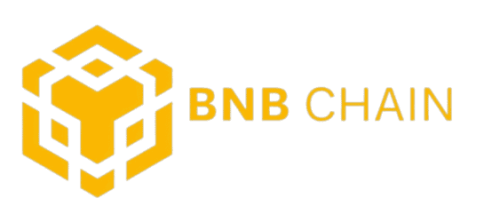What is a Crypto Wallet?
A cryptocurrency wallet is a device or piece of software that grants you ownership of your crypto assets.
Although there are a few different types of wallets (we’ll delve into that below), all crypto wallets have two things in common: they come with a public key and a private key.

A public key is a unique string of letters and numbers that serves as your wallet’s public identifier. Not only can you safely share your public key with anyone, you need to if you want to receive funds in your wallet.
Your private key, on the other, should not be shared with anyone. It’s the piece of information that proves your ownership of the assets tied to your wallet. When you decide to send crypto out of your wallet, the transaction must be signed off using your private key.
A critical point of understanding here is that a wallet doesn’t actually “store” your cryptocurrency in the same way that a physical wallet holds your cash (yes, this includes the physical cold storage wallets we’ll talk about later!). Your crypto is stored on the blockchain; a wallet simply gives you access to your private keys.
“Not Your Keys, Not Your Coins”
If you’ve spent any time in the crypto community, you’ve probably heard the phrase “not your keys, not your coins”. If you don’t have ownership of your wallet’s private key, you don’t really own any of the funds in it.
“Well, duh,” you might think. Why wouldn’t the owner of a wallet own that wallet’s private key?
Well, as it turns out, that’s exactly the case when your wallet is tied to a centralized exchange like Coinbase, Kraken or Binance.
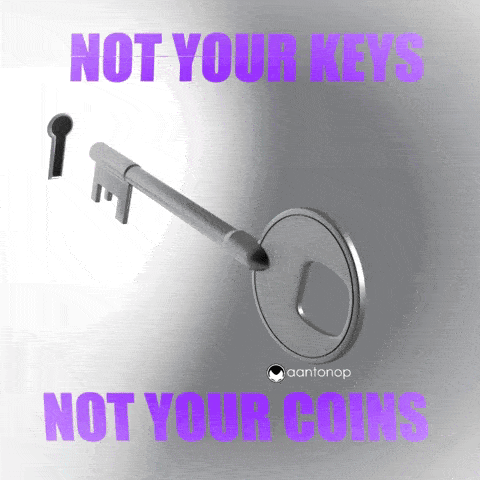
When you store your assets on an exchange wallet, your private keys are held by that company on their servers (or in cold storage; more on that later).
In effect, you’re trusting them to secure your private keys from theft and to use it to sign off on any transactions you initiate. Because they manage your keys, they technically own your coins. You’ll often hear these wallets referred to as “custodial wallets”.
For many, letting exchanges control their private keys isn’t too big of a deal. After all, these are big, reputable companies with a lot to lose if they were to ever mishandle our keys.
But if you prefer to have true peace of mind (or if you really subscribe to the ideals of decentralization propped up by many in the crypto community), then you might find it prudent to move your coins off of exchanges and into a wallet whose private keys you own.
Types of Wallets
Ultimately, the decision of custodial vs. non-custodial ownership is up to you. But regardless of what you choose, it’s important to first understand the different types of wallets available.
Software wallet
A software wallet is an application installed on a computer or smartphone that stores your private keys on your device, browser, or on a third-party server. They can be both custodial and non-custodial and are usually connected to the internet, classifying them as hot storage wallets (more on that below).
Hardware wallet
A hardware wallet is a physical device on which your private keys are stored, making them inherently non-custodial. They are not connected to the internet, making them cold storage wallets.
Cold Storage vs. Hot Storage
Wallets can also be broken down into the ways in which your keys are stored.
Cold Storage
Cold storage refers to your private keys being held offline, which guarantees safety by ensuring that not even the savviest of hackers can steal your keys.

Because hardware wallets are designed to hold your keys offline, they are by definition cold storage wallets, but there are also some companies that now provide software wallets with offline key storage (e.g. Armory).
For those looking to HODL large amounts of crypto for a long period of time, cold storage is undoubtedly the way to go.
One thing to keep in mind, though: a major downside of cold storage is that users must be extra diligent in preserving a physical backup of their private key (usually presented in the form of a 24-word mnemonic).
Should a user lose both their hardware wallet and their private key backup, their funds will be lost forever.
Pros:
- Safest way to store crypto; great for HODLing
- Total ownership of your private keys
- Hardware wallets look pretty cool
Cons:
- Inconvenient for trading crypto
- Costs money to buy a hardware wallet
- Risk of losing hardware wallet and backup of private key
Hot Storage
Hot storage refers to your private keys being held on a device connected to the internet (i.e., most software wallets). This potentially exposes your keys to hackers, making it riskier than cold storage.

The plus side is that, due to its connection to the internet, hot wallets generally offer more utility than a cold storage wallet. They make it much easier (and more convenient) to buy, sell and swap crypto, and often allow you to do things such as interact with DeFi protocols and stake coins to earn interest.
If you’re looking to regularly trade crypto or don’t have too much invested, there’s nothing wrong with keeping some assets in a hot wallet. If you’re dealing with large amounts, though, you’d probably be better off putting the bulk of it in cold storage.
Pros:
- Easy to trade crypto
- Allows you to interact with DeFi protocols
- Free
Cons:
- Risk of being hacked
- Many hot wallets are custodial (“not your keys, not your coins”)
Hosted Storage
Hosted storage refers to your private keys being held on a third-party server.
Should a server be hacked, all private keys held on that server would be exposed. That’s a scary prospect for the big names in the industry, so most exchanges actually keep most, if not all, of their users’ funds in cold storage.
What to Look For in a Wallet
What should you be looking for when picking out a wallet?
Outside of what we learned above, here’s a few other things to keep in mind.
Security

What measures are wallets taking to keep your assets secure?
One big thing to look for is two-factor authentication, or 2FA. In the event of your password being compromised, 2FA provides a second layer of verification to ensure that it’s really you logging in or initiating a transaction, usually in the form of either a security code sent to your phone or a 2FA app on your phone.
Another security measure is known as multi-signature verification. This is when multiple digital signatures are required to sign off on a transaction, hedging against a scenario in which a private key stored on one device is stolen.
Utility

Another important thing to consider is the utility that a wallet provides.
What blockchains—and thus coins and tokens—does it support? Can you send payments? Can you stake to earn interest? Can you interact with DeFi apps?
What other perks does it have? For example, Crypto.com offers a cash back Visa card with a host of perks (e.g. Spotify rebate) depending on the amount of CRO, their native token, that you stake.
There is no one-size-fits-all wallet. Everyone has different goals and preferences. Are you looking to hold or trade regularly? Do you want to use DeFi apps or earn interest? Even things like user interface may play a role in helping you decide which wallet is best for you!
To help you decide on the wallet most suitable for your needs, let’s go over some of the best ones and what they offer.
Best Crypto Wallets
Best Hardware Wallet: Ledger Nano
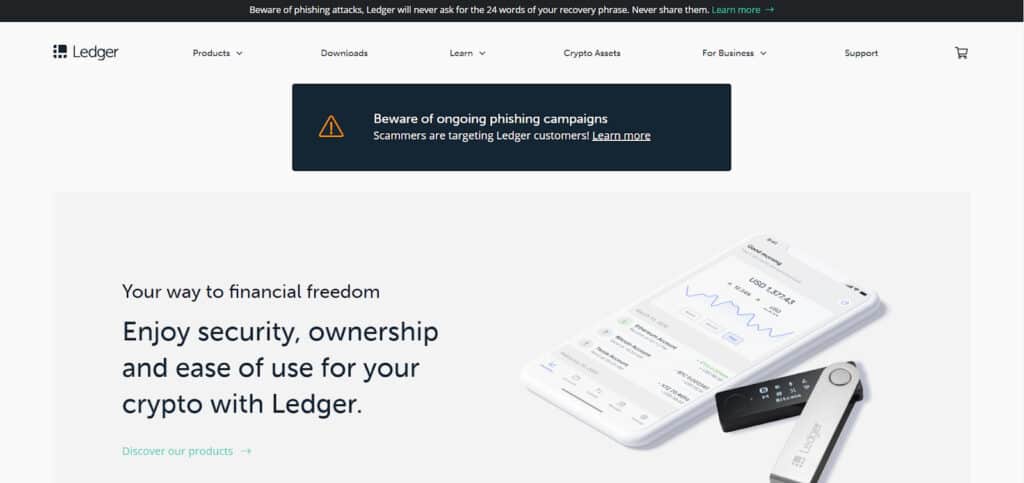
Alongside the Trezor, the Ledger Nano is the industry standard for cryptocurrency hardware wallets.
Coming in two models, the Nano S and the Nano X, the Ledger features a sleek silver design and state-of-the-art technology to keep your private keys secure and offline.
In addition to simply receiving and sending coins, the Nano goes above and beyond by incorporating buying, selling, swapping and even lending protocols built into its desktop interface, Ledger Live.
It also supports 22 cryptocurrencies and over 1,500 ERC20 tokens on the Ethereum blockchain, making it more than satisfactory for all your HODLing needs.
Inherent in its design as a hardware wallet, however, is the inconvenience involved in doing… well, anything, with it. To carry out any transaction, you’ll have to physically plug your Nano into your computer and punch in your passcode on the tiny one-button screen to sign off on it. As you can imagine, this isn’t ideal if you’re looking to buy and sell frequently, especially if you’re on the go and without a computer.
Pros:
- Secure cold storage
- Supports a wide range of coins and tokens
- Ledger Live provides some utility
Cons:
- Expensive
- Inconvenient for frequent activity
Best Browser Wallet: MetaMask
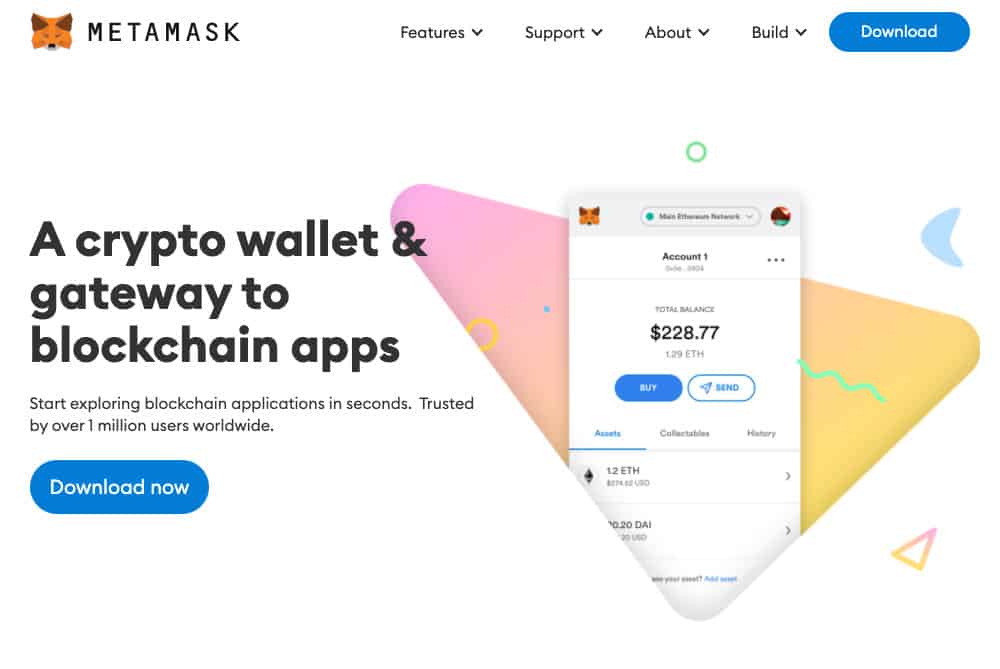
MetaMask is a non-custodial software wallet designed primarily for browser use.
In addition to allowing you to store and manage your own private keys, MetaMask is popular for its ability to interact with decentralized blockchain applications (if you’re not sure what those are, check out our guide to DeFi!).
Designed as a browser extension, MetaMask makes it incredibly convenient to connect to browser DeFi apps (or dApps), requiring only the clicks of a few buttons. It also has a built-in swap feature that scours the world of decentralized exchanges for the best rates, charging a small fee in the process.
It’s important to note that MetaMask is built for the Ethereum blockchain (and various Layer 2 solutions like Polygon), meaning that you won’t be able to store Bitcoin on it!
Pros:
- Non-custodial
- Great utility: allows you to interact with DeFi apps (or dApps) and buy and swap crypto
- Browser extension makes it extremely convenient to connect with browser dApps
Cons:
- Hot wallet, which presents a risk of being hacked
- Ethereum blockchain only (can’t store Bitcoin)
Best Mobile Wallet: Trust Wallet
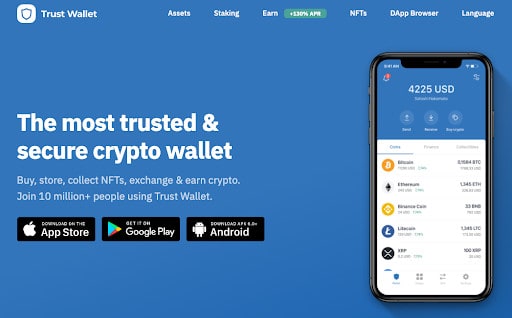
Trust Wallet is a non-custodial software wallet designed exclusively as a mobile app.
Like MetaMask, Trust hands over your private keys while allowing you to interact with dApps.
Unlike MetaMask, which comes across as a bare wallet with DeFi utility, Trust is a more complete, all-around crypto platform.
It does allow you to hold Bitcoin (and pretty much every other major coin or token) while offering a host of features typical of centralized exchanges, including earning interest and buying non-fungible tokens (NFTs).
When it comes to DeFi, Trust also boasts a built-in dApp browser, allowing you to interact with dApps from within their own ecosystem—a super convenient and useful feature, especially for beginners! Unfortunately, this was removed from the iOS app (it’s still available on Android, though), meaning that if you’re an iPhone user looking to dip your toes into dApps, you’ll have to find your way onto the dApp’s browser site and manually connect your wallet.
Pros:
- Excellent gateway into non-custodial ownership and decentralized finance for those who prefer handling their crypto on mobile
- Excellent utility: interact with DeFi apps; buy, sell and swap crypto; stake and earn interest on crypto; collect NFTs
Cons:
- Hot wallet, which presents the risk of being hacked
- DApp Browser removed from iOS, making it less convenient to interact with DeFi apps (though still possible)
Best Overall Exchange Wallet: Coinbase
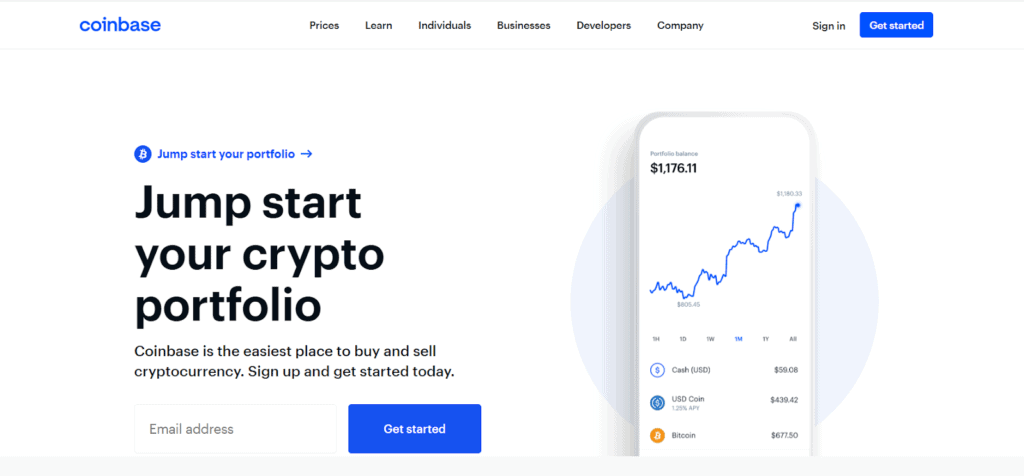
Coinbase is perhaps the most popular exchange for a reason: it’s got everything you need to get started in the world of crypto.
Boasting a clean and intuitive user interface, Coinbase makes it easy for beginners to buy and sell a wide range of cryptocurrencies while viewing the growth of their portfolio value over time.
And although it is a custodial wallet, Coinbase has taken great measures to protect your assets. Not only does it keep the majority of your funds in cold storage, they insure it against hacks and security breaches.
If you’re just getting started, it’s hard to go wrong with Coinbase.
Pros:
- Minimalistic, easy-to-use design makes it great for beginners
- Great visualized tracking of portfolio value over time
- Insured against hacks and security breaches
Cons:
- Custodial
- Some user funds are held in hot storage, which presents a security risk
- Limited utility
Most Secure Software Wallet: Armory
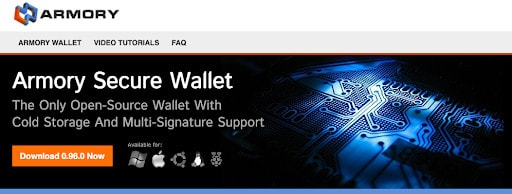
If you want the security of a hardware wallet without the hassle of actually needing to plug in a physical device (or, for that matter, pay for one), look no further than Armory.
Considered the pioneer of cold storage technology, Armory protects your assets by holding your private keys in an offline computer that never touches the internet. Even more security is provided through multi-signature support, allowing you to require up to 7 different keys to sign off on any transaction.
Unfortunately, Armory only supports Bitcoin, has no mobile app and offers no utility beyond plain ol’ storage. Its desktop app is also far from beginner-friendly, so stay away if you’re new to crypto.
Pros:
- Funds held in cold storage
- Multi-signature support
Cons:
- Only supports Bitcoin
- No mobile app
Conclusion
Wallets are an important aspect of the crypto world, but they can also be a little tricky to wrap your head around if you’re new to this space.
If you were confused by the seemingly endless list of apps and platforms out there, we hope that this article cleared things up a bit for you!



